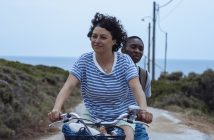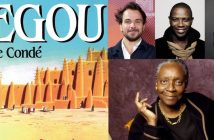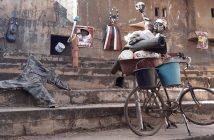Lee Isaac Chung, good morning. We are in Cannes for the 60th edition of the Festival. This is your first feature film; you have been selected in a very official competition. What are your impressions?
It’s always been a kind of dream to play at this festival so I’ve always elevated it quite highly. A lot of my heroes have played here. But at the same time, coming here is interesting to see both sides of the Festival, to absolutely fall in love with the films but also to see this side of glamour that I wasn’t necessarily prepared for. But overall it’s been a great experience because we’ve been able to show the film on quite a large stage and it’s been exciting for the Rwandans as well.
The film draws its origin from a trip you made to Rwanda in a humanitarian camp. Could you explain how it came about and what the work of the people there was?
It came about because my wife had been doing volunteer work for the past three summers in Rwanda and she wanted to go back and asked if I wanted to go with her. I thought it’d be a great way to spend the summer. I figured the only thing I really knew how to teach was film-making because I’d been teaching some of it in graduate school. So we thought we should go ahead and make a feature-film as we were reading more about the state of Rwandan cinema and the actual history of what’s been filmed in Rwanda. We thought it was interesting that nothing had been made in Rwanda about the present day. A lot of people are asking the same question in Rwanda : « Why aren’t people making movies about what’s happening now? Why did they recreate the Genocide only? » To me, this was very interesting, I thought the project itself would be great to explore.
Basically, I convinced two of my friends from school that they should come with me and we taught this class and went ahead to make a feature-film because none of us had ever done that. When we went there, we really fell in love with the country and we had a very basic story based on the things that we’d been reading in the papers and journals about what’s happening with the Genocide survivors these days. We explored the country, talked to many people, and met many children who are orphans of the Genocide, interviewed them and asked them about their lives and their experience on a day-to-day level. Two of these orphans whom we talked to had their stories that compelled us so much that we ended up auditioning and casting them for the two main roles. A lot of the elements you see in the film are actual things from their lives.
Writing the script for the film was a collective work with other people from this workshop. I’m guessing it was a deep, long and difficult process as it’s about memory and remembering very painful events.
Yes, it’s very interesting that you say that because we did engage in so much dialogue and that was really the substance of the film. I felt like it’s a product of dialogue and we really enjoyed that process of film-making. I think it was a necessity because we didn’t know too much about Rwanda and since we’re outsiders of the culture, in order to convey a culture, you really have to root yourself within it and explore it. I would say this was definitely the best part of shooting the film.
Your work seems to be very much based on improvisation, letting the actors play their part the way they think is right. How did that work with the people? Did they understand and grasp this way of shooting films? Were there any conflicts?
There is a rich tradition in Rwanda of doing drama so acting in itself seems to be a talent that many of them there have. For instance, if you go to any birthday party or wedding, each man stands up at one point and delivers a speech or tells a story, their goal being to entertain the crowd. In a way, it was in everybody to perform. But also, what was important for us, as you were saying earlier, was to ask them what had happened in their past. I think that once they knew they could trust us and knew what our intentions were, they were very forthright about expressing what had happened in their lives. As we tried to put this in the movie, I think the actors really appreciated this; for them, it was a chance to express their reality. And doing it, knowing that perhaps this film would be shown abroad and that it could be shown to their peers in Rwanda. I haven’t talked to them about whether or not this was a difficult process for them in the sense « did it hurt them in any way or traumatize them? » We believe it didn’t, we tried to be very sensitive to their needs as we did this.
There’s a beautiful passage in the film with dances in Rwanda. It’s quite difficult to see how sweet the dances are and how hard their history is. You also have a way of alternating quite jazzy music with silence. The film is like a reflection of a jazz movement. How did you work the music out?
I guess that a lot of the jazz artists I like made lively music but there’s this underlined melancholy to them; I think of John Coltrane songs. For example, I really love the Love Supreme album. There are moments when you really feel alive listening to this music but at the same time, there is so much sadness hidden there. As you were saying, this is a film of memory and bringing up the past. A lot of the music we incorporated, as well as the dancing, signify more their ancient history; even the music you hear in the beginning when the two boys are walking, which comes back in the end, is a music that a lot of people don’t hear much anymore. This is the type of music in Rwanda that apparently not many people can do. We wanted to incorporate that because it’s a film that discusses how our identity is based in memory. There are so many tragic things and things that need to be forgotten but at the same time, there are so many rich things that are there. In other words, you can’t simply seek progress but life is so entwined with memory and we wanted to play with that, with the form, in the film. And with the other arts such as dancing, poetry
Would you say it’s more a film about your experience in Rwanda or more about trying to bring the experience of others to life on a screen?
I guess I’ve been telling many people that I feel as if I was inspired by the lives there, but as I’ve been editing the film, I realize that there are a lot of things that are important to me and my own identity as something of an outsider here or in the US; there are lots of things that are intertwined. It’s difficult to say one or the other so hopefully it’s both.
You express things on a kind of spiritual level : you have very strong shots of nature, when the voice-over is talking about the whole history. Was it your project from the very beginning to bring these spiritual elements into the film?
I believe I look at the world in a very spiritual way or at least, I believe that anyone in the Arts should look in the world for things that are spiritual. So that was definitely an intention; I’m glad that that comes out. The way that I wanted to encounter that was through chance, like jazz. There’s a shot when I pan up to the trees and as soon as they finish talking, wind begins to blow through the leaves, and this isn’t something I planned but for me, it just felt like there was something spiritual happening as the film is progressing. No matter how strange this might sound, I do believe that something is there.
The whole story of the Genocide brings us to a questioning of humanity. These are universal questions that are important to everybody and we are fascinated by the historical process that happened there because it is a form of barbarity that we could find anywhere on the planet and could come out at any time anywhere. Were you interested in making your film follow that direction or was it something else?
Perhaps you know I did want to be a doctor originally and I’ve always been very interested in social issues. I admit that with this film I did think a lot about more social-minded things. Perhaps in the future, I’ll stray from that further as I pursue this craft a bit more. But with this film, yes, I did have that in mind, that sort of violence that’s hidden beneath so many tensions within the world. Even if there’s a Genocide and a reconciliation, you wonder just how easy it would be for that to erupt again. These questions were interesting for me to explore.
You said at the beginning that no films have been done about Rwanda today. The question today is « how can people live together after the Genocide? » How did you work out this whole question of the reconciliation? What did you want to express on that matter?
I guess I am searching for answers for that as well. I don’t feel like there are such easy answers to it and I suppose that the realm in which I was exploring it was in terms of identity : how you forge your own identity and how that is based in the way we decide to grasp that identity through memory, what it is from our ancient past or perhaps a collective history that we can tap into and understand about humanity. So this is one of the things I’m trying to explore in the film but I don’t believe I know the answers. I know in the film we present a more positive and hopeful response and perhaps that’s a prayer or a wish for the world.
You don’t really have the choice really.
That’s very true. I think the world continues to surprise me.
You said you would come back and pursue your work with young film-makers emerging in this country. Will the film’s success in Cannes lead to the possibility of doing that?
I hope so. I believe that any film-maker should also be engaged in teaching those who want to learn. Actually, I’m still learning, I’m still very young. But I think I have an opportunity here to guide these students in a direction where they see some great films and where they’re not just given equipment and told to go out and film but where they explore the history of the craft. It’s something they seem to really desire so it’s something we want to do. We were very surprised that some of the students we talked to said that it was their dream to make movies. They don’t have the resources and the education to do it but they know that they want to make a movie and I can certainly relate with that.
Do you connect with other initiatives of, for example, François Woukoache, who does a lot for the country and has new films coming out?
I guess I haven’t met too many people doing films in Rwanda or Africa no less. I have been in discussions with Rwandan cinema centers and one of their representatives was very helpful for us. It’s probably my only link to actual things that are happening in Africa. But certainly, I think there needs to be a greater voice from Africa and a greater appreciation for African cinema. There are great film-makers from Africa and it’s ironic to me that we ignore them and choose to make movies in Africa with Western actors trying to tell us, foreigners, that we should feel guilty.
Apart from the actors themselves, you show in the film that the talents are there with this poet and this kind of impressive slam. How did you have this idea and how did you about it?
Poetry has always been a very big influence on me. While we were in Rwanda, I was teaching a class of fifteen students. A gentleman who happened to be in the class told me he was a poet and I wanted students to be exposed to other arts as they were making their little short drama pieces with their photo cameras. So I told them to take photographs that were inspired by this poem. Edward recited it and I was deeply moved and it stayed with me all the way from preparation to shooting time and once we were shooting, I simply wrote it into the film knowing that it has a place there and it’s going to be very powerful.
I guess he did it like in the film, in Kenya-Rwanda. How was it for you to shoot in a language that you don’t speak? How did you manage with giving directions?
I’ll answer this a little differently than I’ve been answering before. It’s always been interesting to me to have a barrier for communication with someone that I’m close to. My parents are Korean and I’m Korean-American and my Korean is not entirely perfect. I don’t communicate very well with my parents. It’s interesting to have a very deep and loving relationship with yet a verbal communication barrier. My short films have been in other languages that I don’t speak and I worked through translators and I enjoy connecting beyond that barrier. I don’t know if that makes sense at all but anyway, it was a great process for me.
What would be your perspectives now, besides going back to Kigali and trying to start this film school? Do you have other ideas for films?
I continue to think about poetry and film. There’s a poem that’s been very moving for me last year called Lucky Life and there’s a film I’d like to make by the same title. It’s about two young men going to the ocean because one of them has found out he’s dying. This will probably shoot in the US, probably in the English language so it’s a kind of departure.
A last and perhaps difficult question : what did you learn in Rwanda?
That’s a very big question. I guess I learnt to listen and that film-making should be about that and thinking about your surroundings. It’s a myth that film-making is about expressing something; I think it’s more about listening and building something from your surroundings.
///Article N° : 5964








